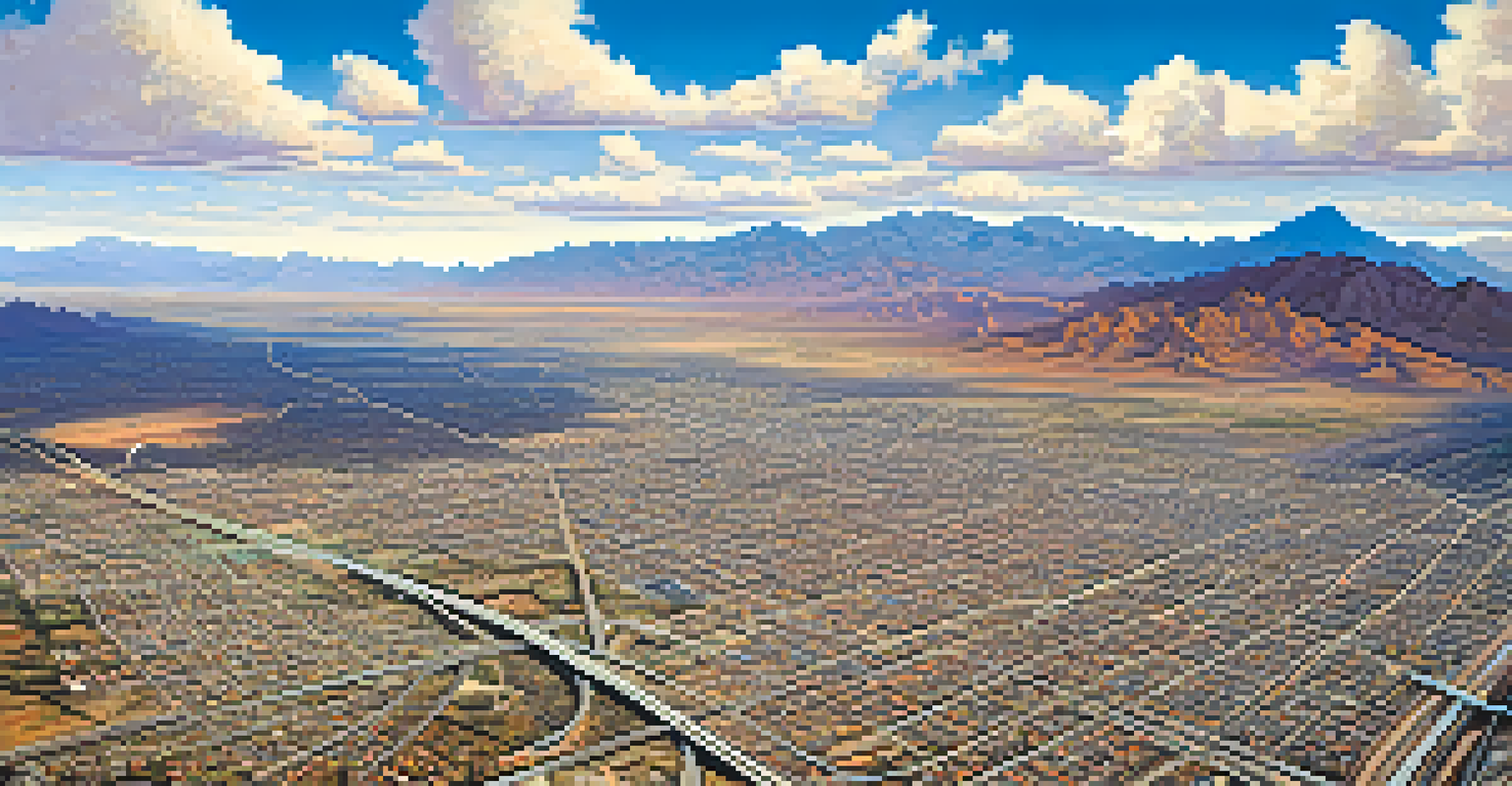Tucson's Role in U.S.-Mexico Trade Relations

Understanding Tucson's Geographical Advantage
Tucson, located just 60 miles from the U.S.-Mexico border, serves as a crucial trade hub. Its strategic location allows for efficient transportation of goods between the two countries, making it an ideal gateway for commerce. This proximity not only facilitates trade but also fosters cultural exchanges that enrich both communities.
Trade is not just about goods; it also fosters cultural exchange between Tucson and Mexico.
The city is well-connected through major highways and railroads, which are vital for shipping products quickly and efficiently. For example, interstate highways allow trucks to transport goods directly into Mexico, reducing transit times and costs. This logistical advantage plays a significant role in attracting businesses looking to expand their operations across the border.
Moreover, Tucson's location supports a variety of industries, including manufacturing, agriculture, and technology. As businesses seek to tap into the Mexican market, Tucson stands out as a prime location for establishing trade operations. This synergy between geography and industry creates a vibrant economic landscape that benefits both nations.
Tucson's Role as a Trade Gateway
Tucson functions as a vital trade gateway between the United States and Mexico, with numerous ports of entry nearby. The Nogales port, just a stone's throw away, is one of the busiest crossing points for commercial goods. This accessibility has transformed Tucson into a bustling center for cross-border trade activities.

The city's infrastructure supports a variety of import and export activities, from electronics to agricultural products. For instance, many companies use Tucson as a staging area to prepare goods for shipment, enhancing efficiency in the supply chain. This role as a gateway not only drives economic growth but also strengthens ties between the two countries.
Tucson: A Trade Hub for Growth
Tucson's strategic location near the U.S.-Mexico border facilitates efficient trade and cultural exchanges, making it an essential gateway for commerce.
Additionally, Tucson's trade gateway status fosters collaboration between businesses and government agencies. Local organizations work closely with customs and border protection to streamline processes, ensuring that goods move swiftly between borders. This cooperation is essential for maintaining a robust trade environment.
Impact of Trade on Tucson's Economy
The trade relationship with Mexico significantly impacts Tucson's economy, contributing to job creation and economic growth. Many local businesses depend on cross-border trade for their livelihoods, resulting in a thriving job market. This economic interdependence strengthens the city’s financial stability and growth potential.
The interplay between trade and community will continue to shape the city's future.
For example, industries such as manufacturing and logistics have seen substantial growth due to trade opportunities. Companies that import materials or export finished products often expand their operations in Tucson, leading to more jobs and investment in the region. This ripple effect enhances the overall economic landscape of the city.
Furthermore, the influx of trade-related businesses boosts local services and infrastructure. As more companies establish themselves in Tucson, demand for transportation, warehousing, and retail also rises. This creates a vibrant ecosystem that supports diverse economic activities, benefiting residents and businesses alike.
Cultural Exchange and Community Ties
Trade is not just about goods; it also fosters cultural exchange between Tucson and Mexico. The continuous flow of people, ideas, and traditions enriches the community. Events like cultural festivals celebrate this diversity, showcasing the deep connections between the two regions.
The presence of a significant Hispanic population in Tucson reflects this cultural integration. Many residents have family ties across the border, creating a blend of traditions and lifestyles that enhance the city's character. This cultural melting pot contributes to Tucson's unique identity and community spirit.
Economic Impact of Cross-Border Trade
The trade relationship with Mexico significantly boosts Tucson's economy, creating jobs and supporting local businesses across various industries.
Moreover, educational programs and partnerships between schools in Tucson and Mexico promote mutual understanding. Students engage in exchange programs, allowing them to experience different cultures firsthand. This emphasis on cultural appreciation strengthens the bonds between Tucson and its southern neighbor.
Challenges in U.S.-Mexico Trade Relations
Despite its advantages, Tucson faces challenges in U.S.-Mexico trade relations. Issues such as tariff changes, border security, and immigration policies can impact the flow of goods and people. Businesses must navigate these complexities to maintain their operations and competitiveness.
For instance, fluctuating tariffs can affect the cost of imported goods, leading to uncertainty for local businesses. Companies might struggle to adjust their pricing strategies, which can impact their profitability. This unpredictability makes it crucial for businesses to stay informed and adapt to changing regulations.
Additionally, border security measures can lead to delays in the transportation of goods. While these measures are essential for safety, they can slow down trade and increase costs. Businesses in Tucson must work closely with regulatory agencies to mitigate these challenges and ensure smooth operations.
Looking Ahead: Future Trade Opportunities
As trade relations evolve, Tucson is poised to seize new opportunities. With a growing emphasis on sustainability and innovation, local businesses can explore emerging markets and technologies. This forward-thinking approach positions Tucson as a leader in adapting to the changing landscape of international trade.
Furthermore, initiatives aimed at enhancing cross-border collaboration could open doors for new partnerships. By fostering relationships between businesses in Tucson and Mexico, both regions can capitalize on their strengths. This collaboration may lead to joint ventures, shared technologies, and increased investment.
Cultural Ties Enrich the Community
Trade fosters cultural exchange between Tucson and Mexico, enhancing the city's unique identity and community spirit through shared traditions and educational programs.
Investing in infrastructure improvements will also be key to supporting future trade growth. Upgrading transportation networks and logistics facilities can enhance Tucson's capacity to handle increased trade volumes. By prioritizing these developments, the city can solidify its role as a vital player in U.S.-Mexico trade relations.
Conclusion: Embracing Trade for a Stronger Future
Tucson's role in U.S.-Mexico trade relations is multifaceted, encompassing economic, cultural, and logistical dimensions. The city's strategic location and vibrant community make it an essential hub for cross-border trade. As Tucson continues to navigate challenges and embrace opportunities, its influence on trade will only grow.
By fostering strong partnerships and investing in infrastructure, Tucson can enhance its position as a key player in international commerce. The interplay between trade and community will continue to shape the city's future, creating a dynamic environment for businesses and residents alike.

Ultimately, Tucson's commitment to nurturing its trade relationships with Mexico reflects a broader vision of collaboration and growth. As both nations work together to enhance their economic ties, Tucson will remain a vital bridge connecting diverse cultures and opportunities.